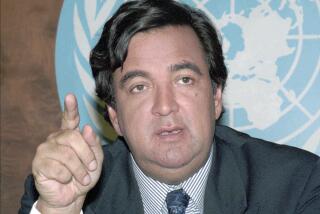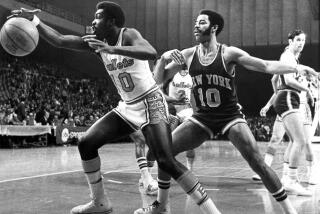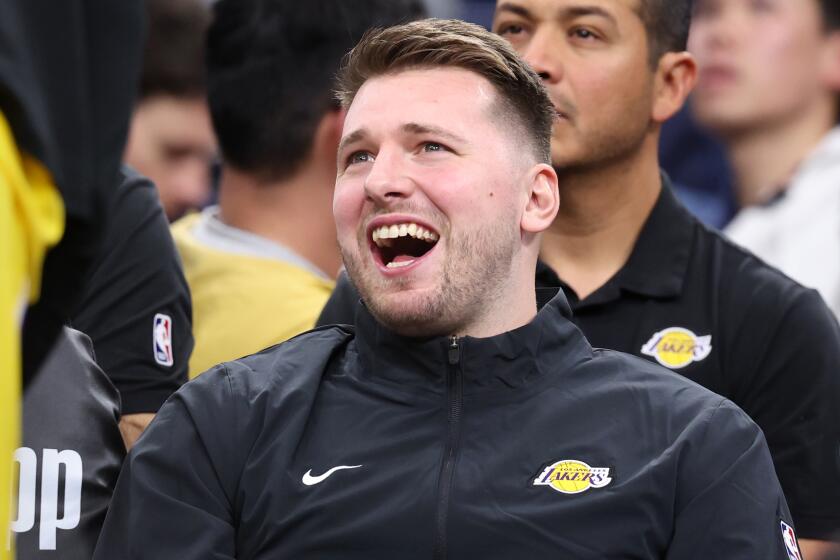THE TROUBLING CAREER OF MICHEAL RAY RICHARDSON : While Drugs Cost Net Guard His Job, in a Number of Ways He Was a Product of System
- Share via
EAST RUTHERFORD, N.J. — Each member of the New Jersey Nets probably had his own way of dealing with the news earlier this week that star guard Micheal Ray Richardson, a three-time offender of the National Basketball Assn.’s drug policy, had been banned from the league for at least two seasons, more likely forever.
But to trainer Fritz Massman, who has seen many Net players come and go over the years, Richardson’s departure apparently was no different than that of any other player who had been waived, traded or just cast adrift in the swampland surrounding the Meadowlands Arena.
As is his custom, Massman walked over to Richardson’s deserted locker, slid the nameplate off the front and taped it to a wall in a back room, alongside the nameplates of all the other departed Nets.
Yes, Micheal Ray Richardson, the Nets’ immensely talented but even more immensely troubled guard, is off the team again. This time, he probably will not return.
On Tuesday, Richardson became the first active NBA player to be banned from the league after he had tested positive for cocaine use for the third time since the 1983-84 season, when the league’s drug policy went into effect.
Richardson, nicknamed Sugar, can apply for reinstatement in two years. But reinstatement is not automatic, and given his age, 30, many are saying that Richardson will never play another minute in the NBA.
Despite the bold headlines in the New York tabloids--”SUGAR FOULS OUT” proclaimed Newsday, and “BANNED FOR LIFE!” screamed the Daily News--this does not mark the end of Micheal Ray Richardson’s tragic and bizarre story.
A once-flourishing basketball career may have been ruined by cocaine addiction, but it is clear that Richardson’s problems go far beyond drug abuse and aren’t easily dismissed.
By most accounts, this is a story of a naive, semiliterate person who came to New York in 1978 from the University of Montana, greatly unprepared for both life in a big city and the pressures of professional sports. He apparently just could not cope.
That, at least, is the view of Richardson’s agent, Charles Grantham, who also serves as executive vice president of the NBA Players Assn. Sitting in his office overlooking Central Park Thursday afternoon, Grantham sadly shook his head and talked at length about Richardson’s low self-esteem, his fits of depression, his other serious problems.
“Micheal Ray is not a unique case,” Grantham said. “Here’s a kid who, right out of college, was chased by agents, probably offered large sums of money by them, is approached by people with drugs to give him and really just finds himself in a different world.
“This isn’t an excuse. Micheal Ray did this to himself. But when you look at it, I see a lot of potential Micheal Ray Richardsons out there. Not just in the pros now, but guys in college and high school.”
Not many athletes who have experienced as many problems, drugs and otherwise, as Richardson stay in the NBA so long. That is a testimony to Richardson’s outstanding talent, which prompted Boston’s Larry Bird to say that Sugar was sweeter than any guard in the league, excluding Magic Johnson.
But when people review Richardson’s eight-year career, which includes selection to the All-Star team three times and being voted comeback player of the year last season, they naturally tend to remember more about what happened off the court than on it.
Richardson has had five known stays in drug-rehabilitation centers since he first experimented with cocaine in 1978. He has also had a variety of domestic and financial crises.
Richardson divorced his first wife and recently had separated from his current wife. He also has had seven agents in five years and still finds himself deeply in debt to various creditors, including at least one of his former agents.
Just in the past few months, Richardson “has been a constant distraction to the team,” Dave Wohl, the Nets’ frustrated first-year coach said.
In late December, after his strange disappearance following a team Christmas party, Richardson entered a rehabilitation center, then eventually rejoined the team. In early February, Richardson missed a practice and could not be located. The league said he passed a drug test and was suspended for only one game by the Nets.
The situation reached the critical stage Feb. 20, when Richardson was arrested for trying to break into his Mahwah, N.J., home at 1 a.m. after his estranged wife, Leah, had gotten a court order barring him from the house.
The NBA, which had the right to administer Richardson’s drug tests whenever it had reason to suspect resumed abuse, called for one Feb. 21, before the Nets left for a two-game trip. When the Nets returned Tuesday, Richardson was told that the test had been positive and that he had been banned.
At first, Richardson doubted the validity of the test, and Grantham sought another test. But Wednesday, Richardson admitted to his agent that he had again used cocaine and that he again needed help.
“It’s obviously clear Micheal Ray has an illness,” Grantham said. “This may be the first time he can spend time singly and fully working out this problem. There won’t be basketball to go back to during his treatment. If he can get his personal life back in control, then maybe we’ll think about continuing his basketball career, maybe in Europe. But we just have to get his life in order.”
Richardson has spent the week back with his wife. He has not granted interviews, but when a reporter for the New York Daily News rang the doorbell Wednesday afternoon, Richardson opened it and said: “All I need is some peace.”
Maybe it is just as well that Richardson is not talking about his latest problems. In the last few days, his previous comments about starting anew have been used as examples of how he has not been good to his word.
For example, in a Sports Illustrated article almost exactly a year ago, Richardson said: “It’s a question of whether a person wants to be a winner or wants to give up. I’m a winner. I’ll be playing basketball until, you know, until the day they kick me out.”
That day has arrived.
The NBA’s mandate greatly saddened but really did not surprise either Wohl or Net players, some of whom have become calloused by Richardson’s repeated and sometimes prolonged absences from the team.
Thursday morning at the Meadowlands, the Nets, who have a 30-30 record, went through a two-hour practice in preparation for tonight’s game against San Antonio, and team spirits were not at all dampened.
Afterward, music blared in the locker room, and some players were intently watching a game show. Even Wohl, whose team had won 9 of 10 games in December before Richardson’s earlier relapse, managed a smile and a joke.
“I can’t stay long,” he said. “We’re going to have a team primal-scream meeting in a while.” At times, Wohl and the Nets had wanted to scream, either in anger or frustration, over the Richardson saga.
“I kind of liken it to a relative with a fatal disease,” center Mike Gminski said. “You keep hoping for him to pull through, but somewhere in the back of your mind, you’re prepared for the inevitable.
“This has been a tough situation for the team. At training camp, Dave (Wohl) gave (Richardson) the ball and said, ‘Here, run the club.’ When you hand over the team to a guy with his problems, well, it isn’t that stable. It’s akin to the quarterback of a football team having all those problems. You have trouble recovering.”
The Nets were 23-14 on Dec. 27, when Richardson admitted himself into Van Nuys Community Hospital for treatment. Since then, they have gone 7-16, and they struggled even after Richardson’s return in late January.
Grantham said that, soon, Richardson will resume sessions with a psychiatrist and probably will undergo drug treatment as an outpatient.
Many people who have been associated with Richardson over the years have already analyzed his past and his personality in hopes of finding clues as to why he would seemingly waste his extraordinary basketball ability.
“All of us will rationally say that no one would choose to jeopardize his career for the sake of having fun getting high,” Grantham said. “Micheal Ray has tried hard to stay clean, and he was for a year. It’s an insidious disease.
“He participated in a drug (prevention) film all the players have seen and explained his problem. Now, people say to me, ‘(Bleep), he didn’t even try to keep his word.’ . . . I’ve known Micheal closely for three years, and I don’t see how people can characterize him as a bad person. Maybe a person with bad judgment.”
Incredibly bad judgment, sometimes.
Richardson basically, has spent money he didn’t have. Mostly, he spent money on cars and drugs. One estimate is that Richardson had bought 16 cars, one a Rolls-Royce purchased not long after he was drafted by the Knicks in the first round in 1978. Willis Reed, then coach of the Knicks, made Richardson sell it.
Richardson, who became a starter in his second season with the Knicks, constantly spent beyond his means and demanded to be traded so many times that he eventually was sent to Golden State in 1982 for Bernard King.
His drug and financial problems intensified at Golden State. Sports Illustrated reported that Richardson missed an East Coast trip that season because “he owed money back East, and there were people looking for him.”
Later that season, Richardson was traded to New Jersey, where he played his best basketball but also began his string of rehabilitation stays.
Reed, now an assistant coach with Atlanta, recently told a New York writer: “He was very impressionable. He was a person who could be led around and easily get involved. . . . He was a great player. He’s a victim of the times and himself.”
Richardson admittedly attended the University of Montana for the sole purpose of playing basketball. In addition to having a severe stuttering problem, Richardson had a limited command of the English language.
Sports Illustrated once published an essay Richardson had written for a sociology class. Part of it read: “Was been good is that I had a fair chance to come in and play as a fr. man. . . . I now this is something I want forget.”
Nets forward Buck Williams, one of Richardson’s closest friends on the Nets, said Richardson has an insatiable need to be loved.
“He is one of the nicest guys I’ve ever met, and I’m not saying that just to sound like I care,” Williams said. “If you needed anything from him, he’d give it to you. The last dollar out of his pocket. Maybe he wanted to be liked too much. Maybe he was too nice. If you were one of the low-lives who got him involved with drugs, he wanted you to like him, too.
“I don’t care what he’s done. I know him and I still love him.”
As harsh as the NBA’s action against Richardson may seem to some, Grantham and others believe it could be a positive step for Richardson.
“Every time Micheal Ray came back from a rehab center, he talked about how he had bottomed out and was rebuilding his life,” Grantham said. “But there was always basketball waiting for him, so he slipped right back into it.
“Micheal Ray has a tenacity and toughness and an energy level to the extent of being hyper. All those things that make him a great basketball player make him a vulnerable person. I think he’s got to become productive in life before we can consider basketball again.”
Grantham said that Richardson still is in debt but not to the extent he once was. He said that not having any of his $750,000 salary will make it tough for Richardson.
“He’s going to be struggling financially,” Grantham said. “He won’t be able to live like he has been. But losing material things and money at a time when your life is falling apart and you’re trying to put it back together become pretty insignificant.
“If Micheal Ray doesn’t play any basketball at all for two years, it will be terminal to his career. However, I have no doubt in my mind that Micheal Ray can play the game.”
It wasn’t the game that gave him problems. Always, with Micheal Ray Richardson, the problems have arisen before and after the game.
More to Read
Go beyond the scoreboard
Get the latest on L.A.'s teams in the daily Sports Report newsletter.
You may occasionally receive promotional content from the Los Angeles Times.










